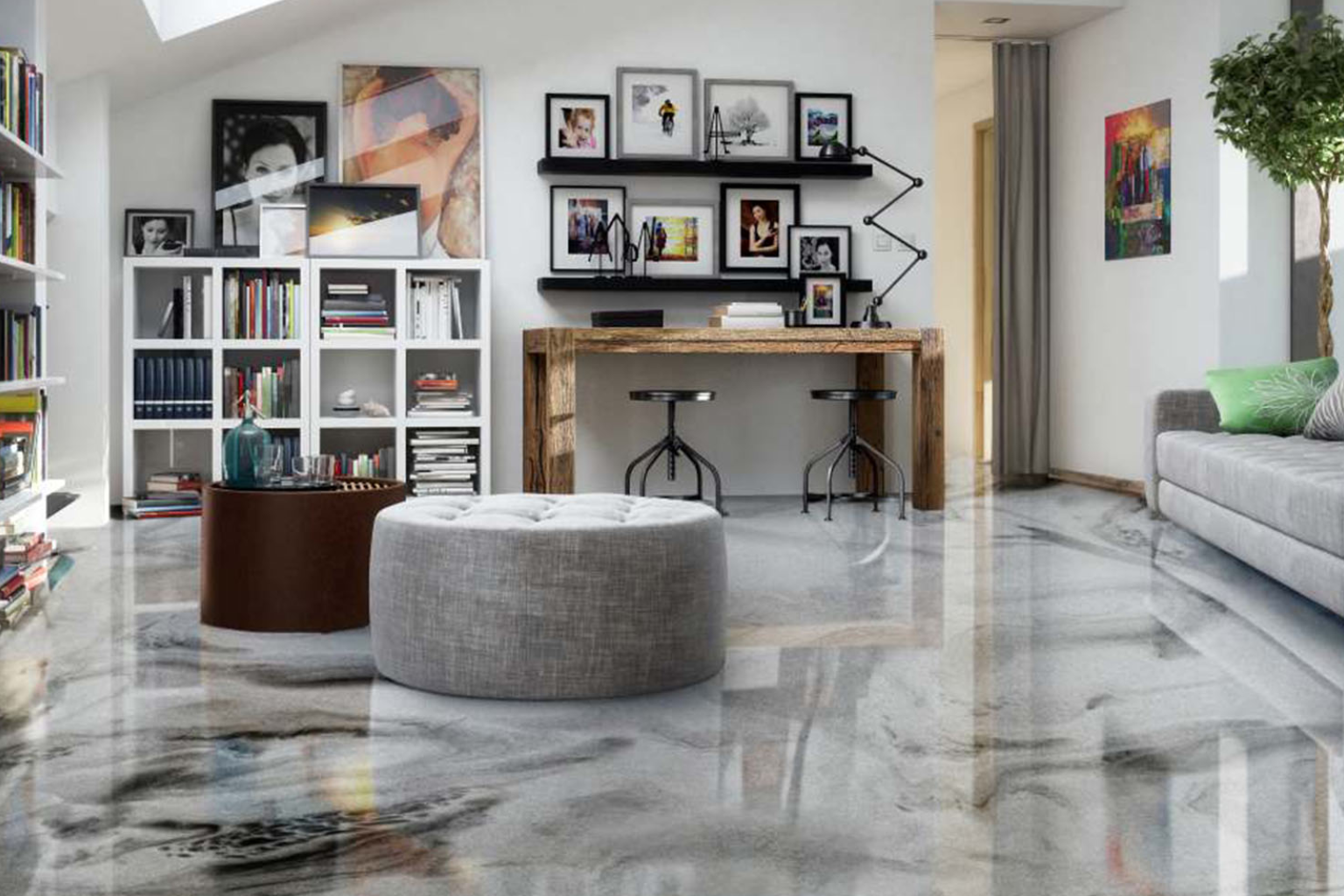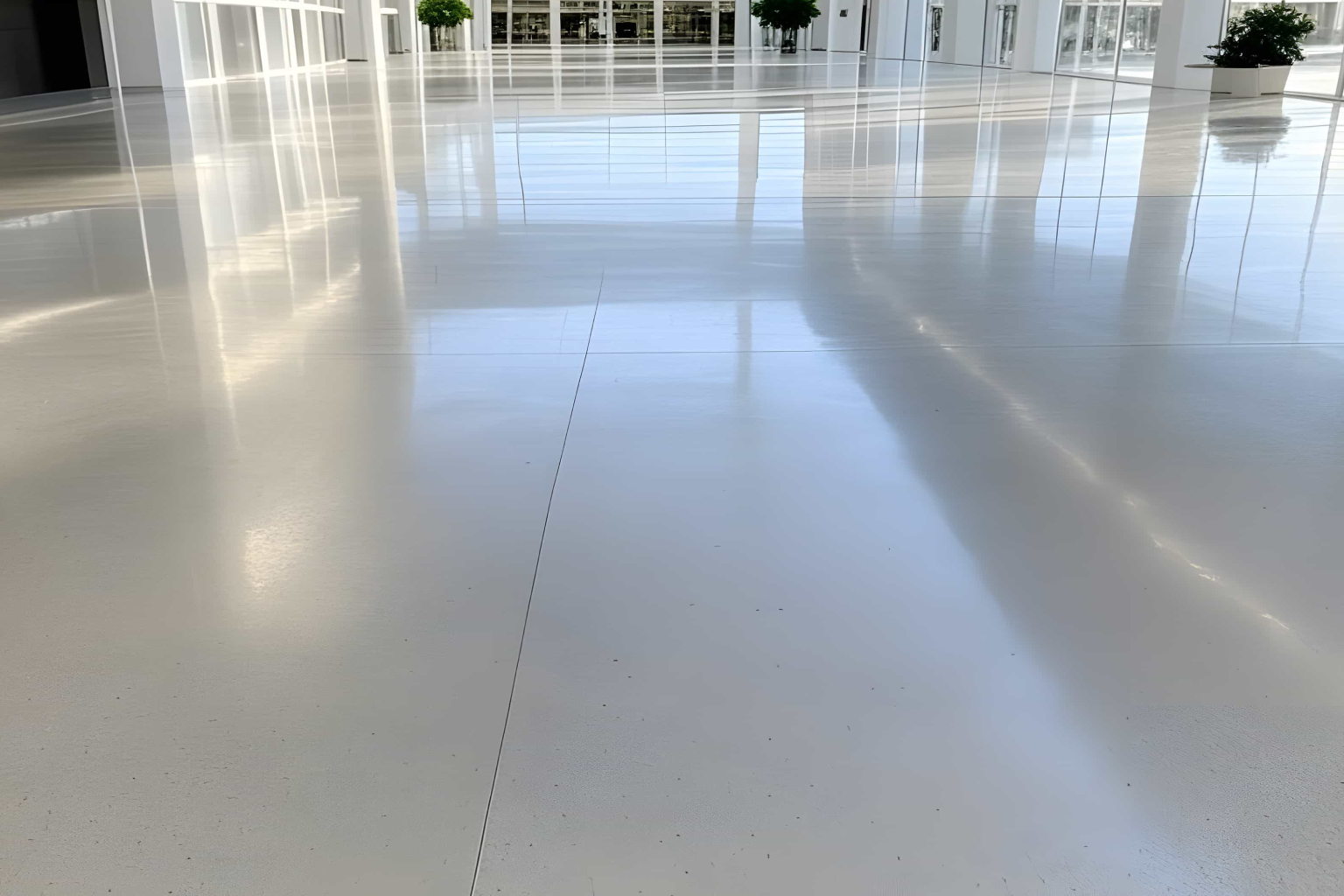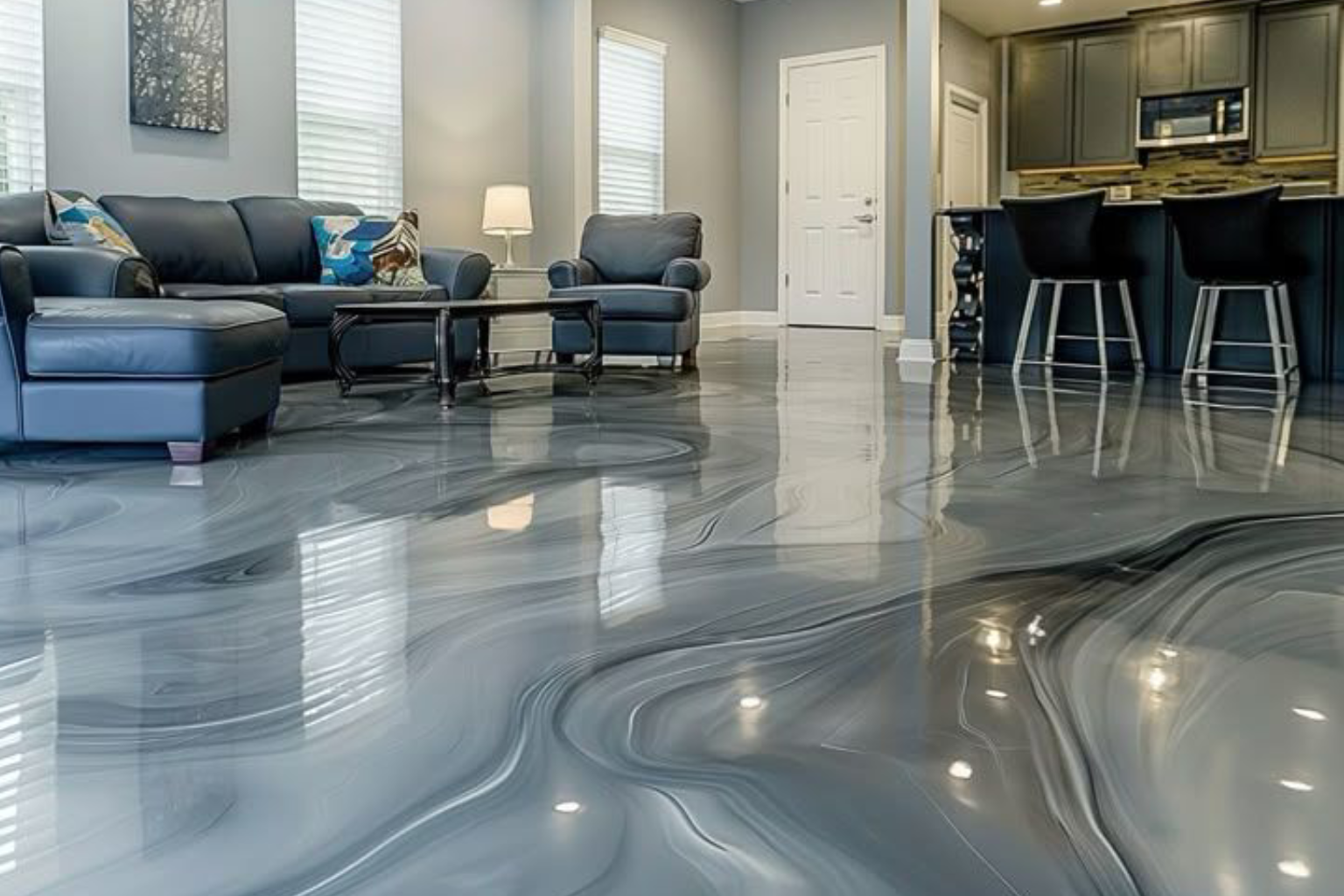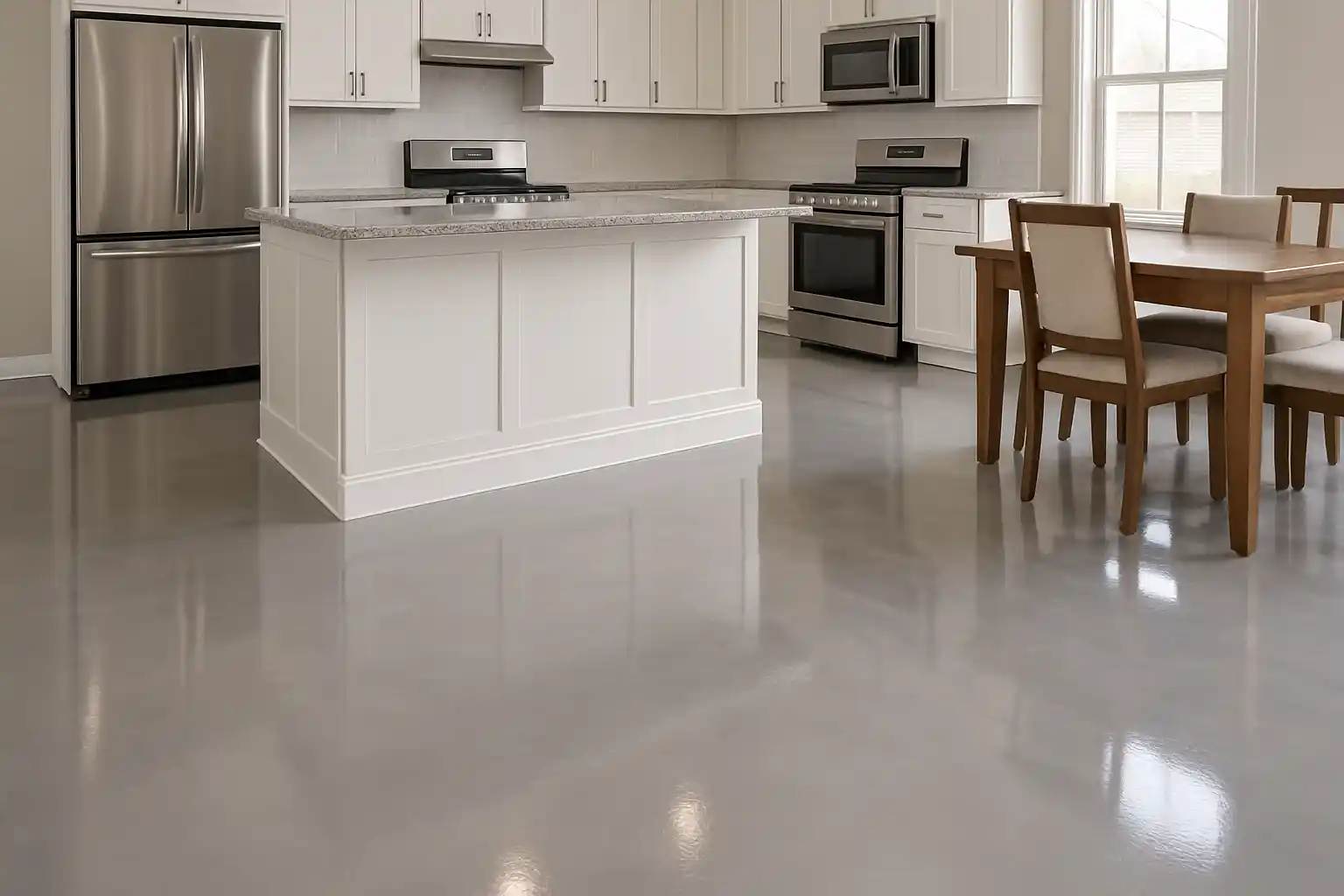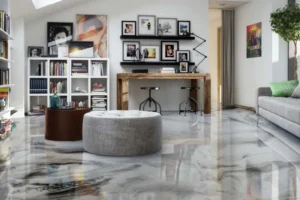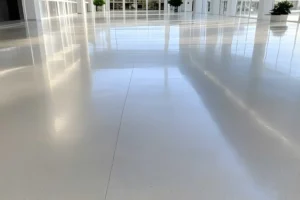Epoxy flooring has transformed from a simple industrial solution to a durable choice for homes & commercial areas alike in recent years. Its appeal has expanded because of its remarkable versatility, easy maintenance & stunning qualities. It’s now not uncommon to see epoxy used in kitchens, living rooms, basements, and even luxury showrooms.
But why has epoxy flooring become so popular? Its unique combination of durability and functionality has made it a preferred choice among homeowners and businessmen. In fact, epoxy flooring offers a variety of suitable solutions for every end-user.
In this guide, we will explore everything you need to know about epoxy flooring. We’ll go through the types available and their numerous benefits. After that, we’ll guide you on how to install it & provide tips for maintaining it. By the end, you’ll have a clear understanding of why epoxy flooring might be great for your next flooring project.
What is Epoxy Flooring?
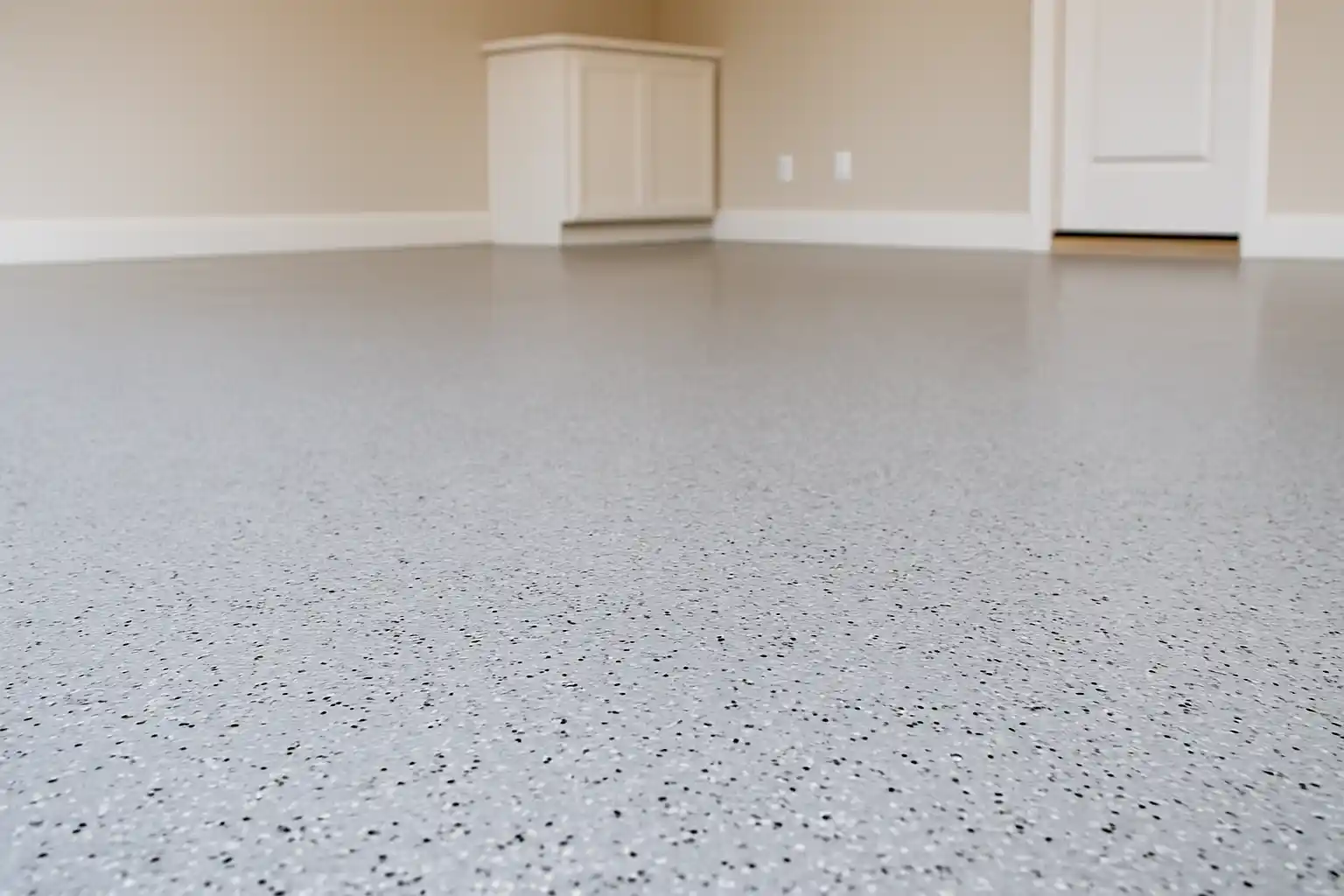
Epoxy flooring is a kind of surface coating. It consists of two main components. One is epoxy resin, while the other is a hardening agent. These two chemicals react when they’re mixed. Then, it forms a durable and tough bond. This functions to adhere to concrete surfaces. The result is a hard-class finish. That’s way stronger than traditional paint or tile adhesives.
The best thing about epoxy floors is that they can handle several factors such as moisture, chemicals & impacts. This makes them suitable for environments that require high durability. Epoxy flooring also serves a stunning look with many finishing options. These range from industrial finishes to glossy metallic designs. This is one of many reasons why it’s so sought after. It requires very little maintenance and still remains in top condition for years.
Types of Epoxy Flooring
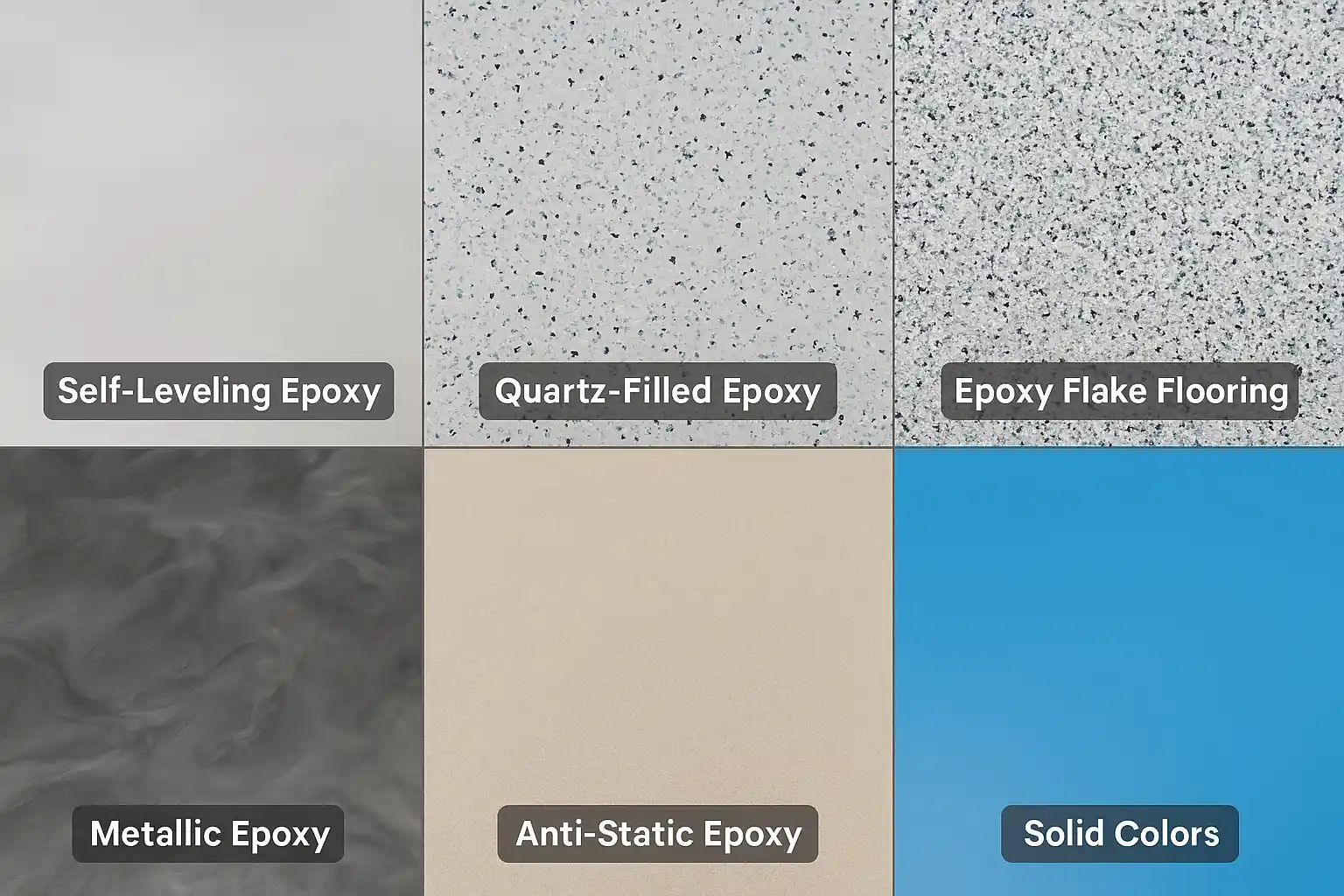
Every epoxy floor is different. That’s why it’s important to choose the exact type. Clearly, it depends on the area and the desired look. Here’s a list of the most popular types of epoxy flooring you must know before making a decision:
1. Self-Leveling Epoxy
Self-leveling epoxy is optimal for smoothing over uneven surfaces. It creates a glossy yet uniform finish. This is perfect for areas that need a clean and level appearance. Self-leveling epoxy ensures that your floors are both functional and aesthetically pleasing.
2. Quartz-Filled Epoxy
The quartz epoxy is mixed with colored quartz grains. Resultantly, it provides a textured & slip-resistant surface. It’s also an excellent option for areas prone to spills. These include kitchens, bathrooms & locker rooms. Moreover, the texture makes both safety and durability better. All these features make it a popular choice for moisture-rich environments.
3. Epoxy Flake Flooring
Epoxy flake flooring includes colorful vinyl chips in the mixture. Hence, it creates a speckled and multi-colored finish. This type of flooring provides extra traction. And that’s the same reason you can walk easily in areas where the floor might be wet or oily. Moreover, the flakes give the surface a unique decorative look.
4. Metallic Epoxy
When it comes to creating a glossy floor with stunning visual effects, metallic epoxy remains the best choice. These include marbling or swirling patterns. The metallic pigments mix with the resin. Thus, it creates a unique and luxurious look. This type of epoxy is often used in high-class homes or entryways since looks play a great role in these sites.
5. Anti-Static Epoxy
Anti-static epoxy flooring reduces the buildup of static electricity. This makes it essential in environments where static discharge can damage sensitive equipment. These areas include electronics manufacturing plants or laboratories.
6. Mortar Epoxy
Mortar epoxy is the most robust option. It’s made by mixing sand or quartz into the resin. This creates a solid surface that can manage heavy traffic. Hence, it’s perfect for high foot traffic areas. Such areas include warehouses and big industrial units.
7. Solid Color Epoxy
Solid color epoxy offers a clean, uniform finish with a single, consistent color across the entire surface. This type is best for those who want a simple look without additional textures or patterns. It’s easy to clean and ideal for residential garages and commercial spaces.
The Investment-Worthy Benefits of Epoxy Flooring
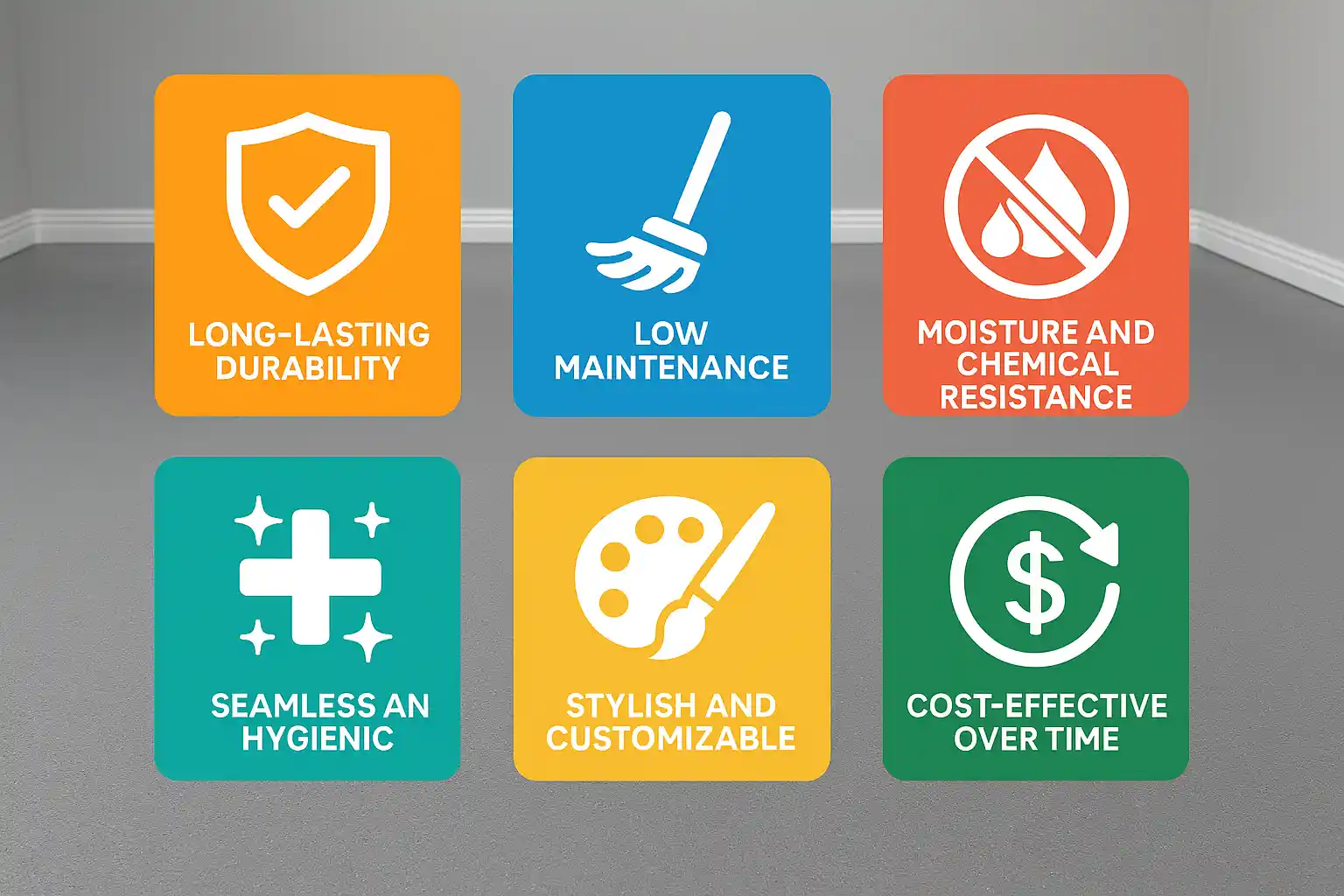
There are many benefits of epoxy flooring that make it a great investment for homeowners and businesses alike. Let’s discuss some of the key points:
Long-Lasting Durability
Epoxy floors are famous because of their strength. It can bear heavy foot traffic and even vehicle movement once it gets fully cured. Not to forget, its durability guarantees that it won’t wear easily over time.
Low Maintenance
Epoxy floors require minimal management, unlike traditional flooring options. Moreover, it can’t trap dust because of a non-porous surface. Regular sweeping and occasional mopping is enough for cleanliness.
Moisture and Chemical Resistance
Epoxy can naturally handle moisture and chemicals. And that’s one of the major reasons epoxy is used in commercial areas. Furthermore, you can wipe away the spills. This makes epoxy a practical choice for areas with liquid or chemical exposure.
Seamless and Hygienic
Epoxy floors have a smooth surface. Bacteria can’t gather since there are no cracks. This feature is the reason that epoxy has become a hygienic option for hospitals and kitchens. In short, all those places where cleanliness is paramount.
Stylish and Customizable
Epoxy flooring can be really adjustable according to every look. In fact, it offers nearly unlimited possibilities for customization, whether you want a modern floor or a metallic design.
Cost-Effective Over Time
Though the initial installation of epoxy floors costs way more than traditional options, such as vinyl or carpet. The long-term savings are significant. In fact, epoxy floors save you money on maintenance and replacements with a lifespan of 10–20 years.
The Best-Working Applications of Epoxy Flooring
Epoxy flooring is incredibly adaptable. Not to mention, it’s suitable for a wide range of environments. Let’s have a look at some of its best applications:
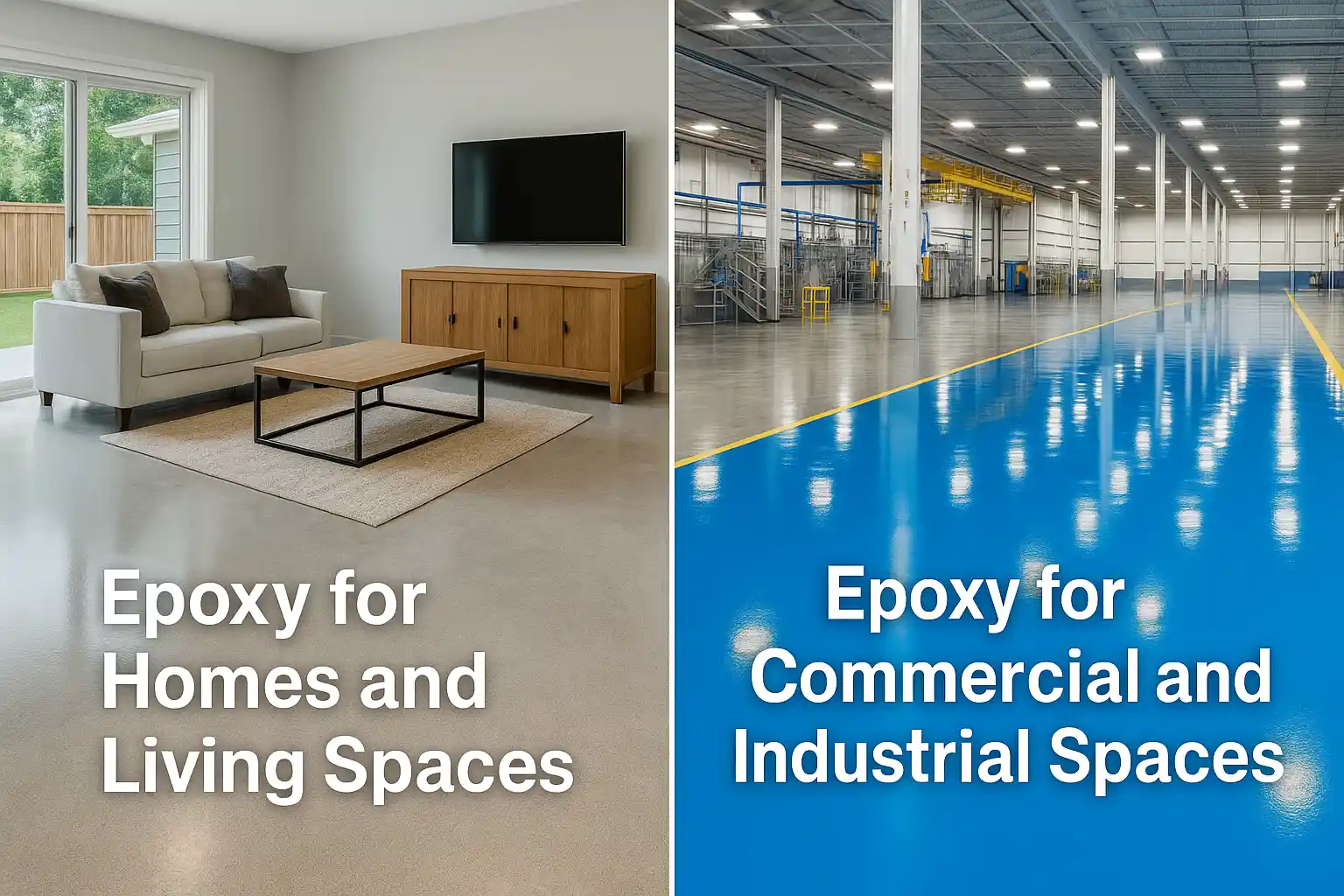
Epoxy for Homes and Living Spaces
More and more homeowners are choosing epoxy flooring nowadays. And, it’s not just for its toughness. In fact, the reason is the stylish look it brings to modern living areas. Some of the most common areas where epoxy works well include:
- Garages: Oil-resistant and highly durable, epoxy garage flooring is a great solution for busy homeowners. It can manage vehicle traffic and spills. Meanwhile, it keeps the area easy to maintain.
- Basements: Epoxy is moisture-resistant. It’s great for basements that are liable to dampness.
- Kitchens and Bathrooms: It’s ideal to use epoxy floors for kitchen and areas with humidity concerns due to epoxy’s water-tolerant surface.
- Laundry Rooms: It’s manageable and has a slip-resistant surface. This makes epoxy an excellent option for laundry rooms.
Epoxy for Commercial and Industrial Spaces
Commercial spaces benefit from epoxy flooring’s incredible features. The important ones include strength and stylish variations. Use epoxy for commercial spaces, since it’s a reliable option for demanding environments. Epoxy is frequently used in:
- Retail Shops: Epoxy offers stylish flooring options. This creates a professional atmosphere in retail environments.
- Hospitals: Epoxy flooring is very hygienic. This feature alone makes it suitable for healthcare setups.
- Factories and Warehouses: Epoxy guarantees endurance to chemicals. That’s why it’s great for increasing safety in industrial areas.
How to Choose the Right Epoxy Flooring for Your Space
It involves several factors to select the suitable epoxy type for every budget. Your choice of epoxy floor largely depends on the space, whether you’re choosing epoxy for home or for commercial space. Let’s go through the main considerations.
The Impact of Room Function
The function of the room plays a crucial role when you want to select the right epoxy flooring. Each area has unique needs. For example, garages and workshops take advantage of durable options to handle chemicals and decrease falling risk. Such as mortar or flake epoxy.
Not to mention, kitchens and bathrooms demand moisture-absorbing coatings. That’s why self-leveling epoxy works great in kitchens. Meanwhile, quartz-filled epoxy in bathrooms offers texture for safety purposes.
In addition, metallic epoxy is fine for living rooms and bedrooms. It has a modern look with customizable colors.
Commercial and industrial environments demand more specific solutions. Self-leveling epoxy is popular in offices and hospitals because of its professional appearance. Moreover, it can manage heavy foot traffic.
Meanwhile, industrial settings like factories and labs are best served by mortar epoxy or ESD epoxy solution. They are great at handling impact and static electricity since it’s critical in settings like electronics production or clean rooms.
Blend Style and Function
Epoxy flooring has a great selection of styles and colors. That’s why it’s easy to match your flooring choice with the overall design. Neutral tones provide adaptability and work great in homes and showrooms.
However, metallic epoxy is good for those people who’re looking for a more luxurious feel. This delivers a glossy yet marbled finish. It’s ideal for high-class areas such as designer kitchens or entryways.
Decorative epoxy flakes bring color and visual interest, in case you want to add personality to your area. Moreover, you can blend options such as metallic epoxy combined with quartz granules. They give striking visual appeal and enhanced slip protection. This makes them great for practical yet stylish areas.
Balance Costs and Features
Your budget plays a key role in determining the type of epoxy flooring. Doubtless to say, epoxy is more affordable than materials like hardwood or luxury tile. However, prices can change according to style and installation complexity.
Standard options typically have a price between $4 and $7 per square foot, such as self-leveling or epoxy flake flooring. They are very durable, even with a budget-friendly price. Therefore, they’re great for both business and home areas.
On the other side, decorative finishes cost a little higher due to their customized appearance, such as metallic or marble-effect epoxy. Not to forget, they require a more labor-intensive installation. Specialized industrial-grade options, such as anti-static or mortar epoxy, can cost even higher based on their enhanced performance in demanding environments.
In short, epoxy flooring delivers long-term benefits even if they’ve a higher cost. Hence, it is an affordable choice in the long run.
The Level of Professional Skill
It’s a smart move to consult a professional installer in case you’re unsure about suitable epoxy flooring. Experts bring not only technical know-how but also a clear understanding of matching epoxy systems for your needs.
They ensure proper application and avoid costly mistakes. Not to mention, they know local building codes that might affect your project.
That’s why it’s important to take the time to analyze all before hiring an installer. Request multiple quotes to weigh pricing and services. Also, it’s good to review portfolios or ask for references. You can be certain they have experience with your desired finish this way. Additionally, you can ask about warranties since reputable professionals typically offer guarantees.
The Comparison of Epoxy Flooring & Traditional Flooring
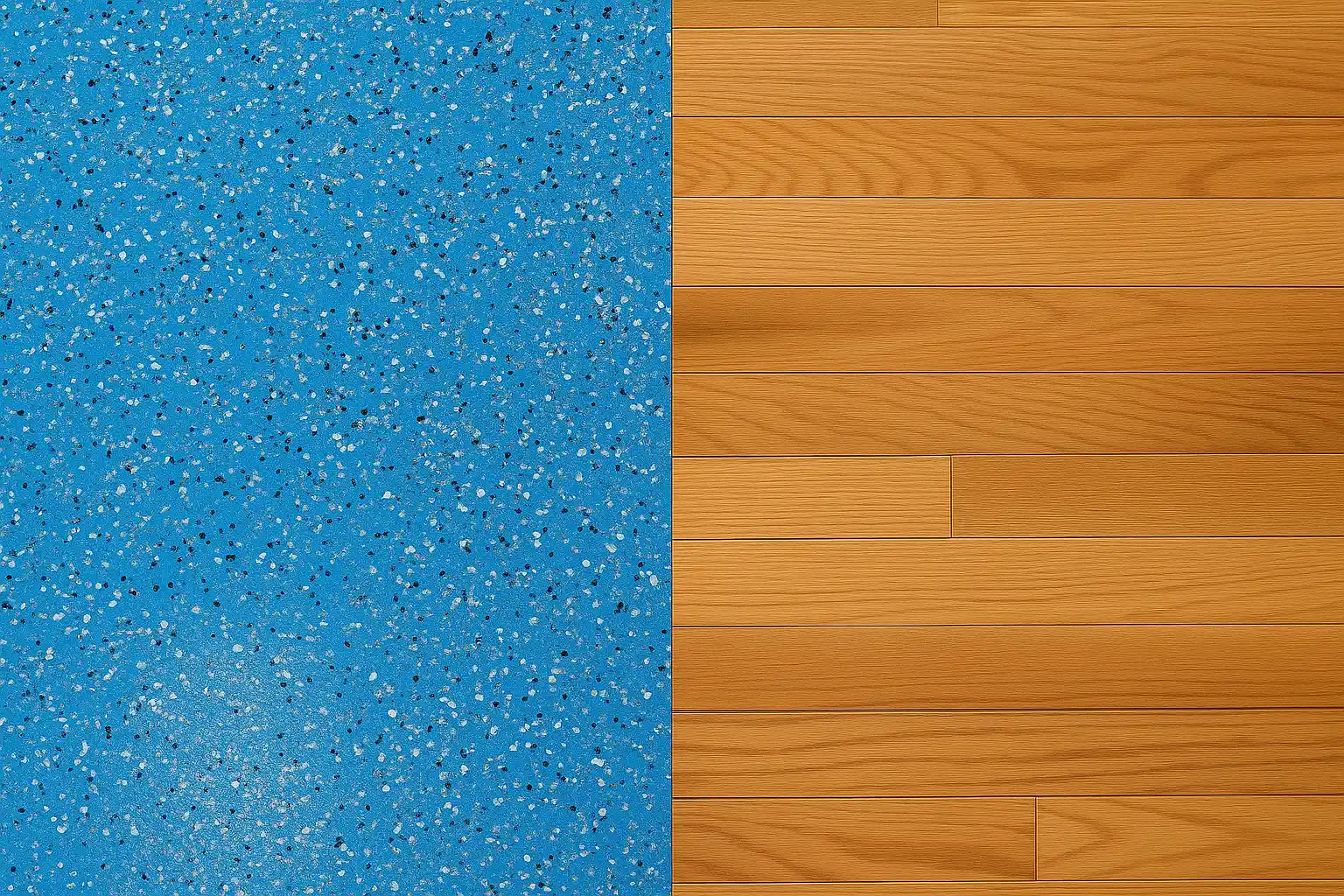
Epoxy flooring has become the talk of town. It has an overwhelming impact on traditional flooring options, such as hardwood, tile, vinyl plank, and marble flooring. However, epoxy always tops when we talk about durability and overall cost-effectiveness. Here’s how epoxy flooring vs traditional flooring fare against each other:
| Feature | Epoxy | Tile | Vinyl | Concrete |
|---|---|---|---|---|
| Appearance | Customizable | Limited | Moderate | Basic |
| Maintenance | Very low | Moderate | Low | High |
| Cost Over Time | Low | High | Moderate | Moderate |
| Moisture Resistance | Excellent | Good | Good | Poor |
| Installation | Professional Required | Labor Heavy | Easy | Existing |
The Epoxy Installation Process
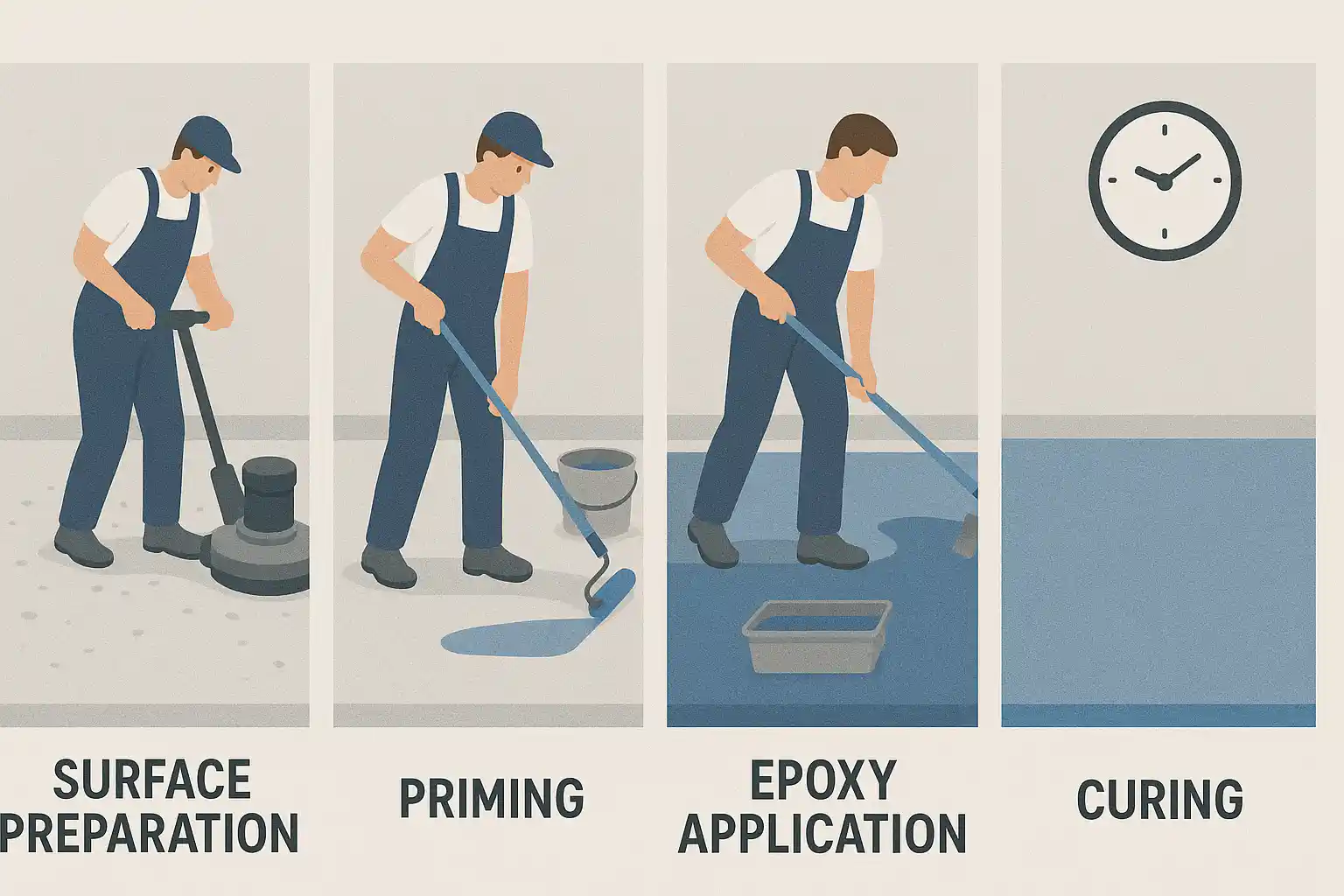
Although it’s possible to apply epoxy flooring as a DIY project. It’s best to let the professionals do the installation. The process requires concentration, proper preparation & timing. This is important to certain that the floor cures properly. Let’s check this step-by-step overview of the epoxy flooring installation process.
Surface Preparation
Surface preparation is the first and most important step in epoxy installation. Professionals clean the concrete surface to remove debris. Otherwise, it could disturb the attachment.
- Grinding: It’s done when your concrete is particularly smooth or has been sealed. Experts use a diamond grinder to get a solid bond.
- Cleaning: The surface must be cleaned thoroughly after grinding. This is to remove dust and dirt. Also, experts do it with a vacuum or mop.
- Repairs: It’s important to repair any cracks or imperfections in the concrete. This is to create a smooth and even surface.
Priming
A primer is applied once the installers prepare the surface. It works by improving the adhesion of the epoxy to the concrete. Moreover, it ensures a long-term bond. Filling in porous areas creates a smoother surface. Therefore, the final coating cures evenly while looking great. In short, priming is a necessary step for anyone wanting to maintain the durability of epoxy floor.
Epoxy Application
The next step after primer curing is the application of epoxy resin and hardener. Installers pour the epoxy in sections for this purpose. They spread it evenly after that by using a roller or squeegee. They mix additives later into the epoxy to create a custom appearance. These include color flakes or metallic pigments
The professional epoxy floor installer will ensure that the epoxy is applied evenly during this stage. They maintain the right thickness. This is to be certain that no imperfections are left in the finish. The type of epoxy decides the number of coats they need.
Curing
The flooring takes time to cure after professionals apply the epoxy coating. The curing process can take somewhere around 3 days. However, it’s mostly according to the breadth of the epoxy and the temperature of the room. The epoxy gets hard & forms a durable surface during this time.
Maintenance Tips for Epoxy Floors
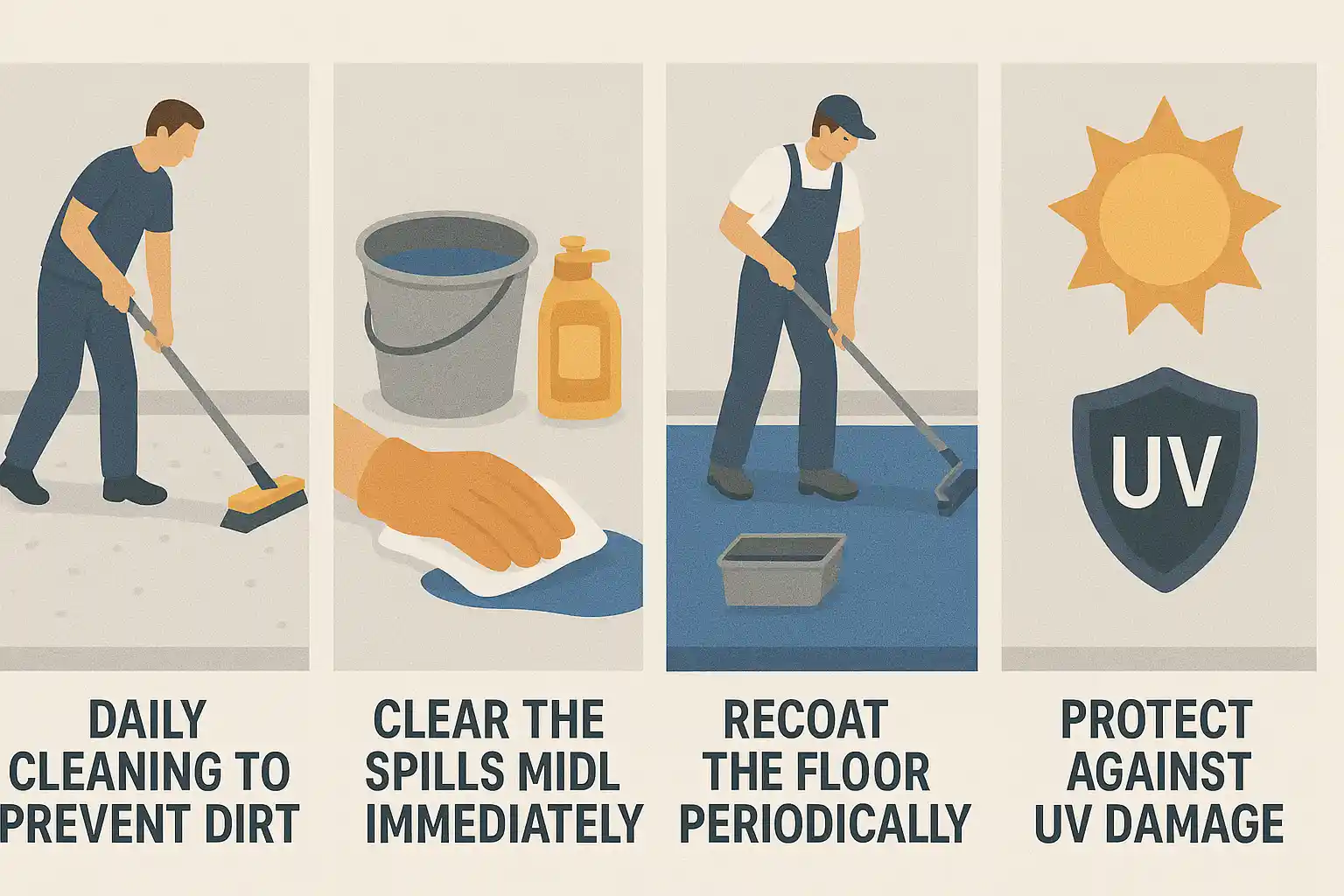
Epoxy floors are famous because of their durability even with little care. However, you can take a few extra steps so that it looks pristine for a long time. No doubt, epoxy floors have great strength. But you need to give them regular care to preserve their appearance. Let’s go through this detailed epoxy floor Cleaning guide:
Daily Cleaning to Prevent Dirt
Dust can pile up on the surface of your epoxy floor as time passes. It’s specifically true in highly crowded areas. These particles can dull the shiny look if they’re not checked on time. You can prevent this situation by sweeping your floor at least once a week. And more frequently in high-traffic areas.
Clean with Mild Soap & Water
Epoxy floors can be cleaned easily. However, it’s important to use appropriate cleaning products to avoid chances of corrosion. Harsh chemicals can destroy the epoxy surface over time. It’s more suitable to use a mild soap along with warm water. This gentle solution will remove dirt without risking the floor’s protective layer.
Clear the Spills Immediately
Epoxy flooring can definitely manage certain substances. However, it can damage the finish if the substance remains on it for a long period. You must clean the spills instantly to avoid dulling the surface. You can use a non-abrasive cleaner for tougher stains. Moreover, use a plastic scraper for sticky substances.
Recoat the Floor Periodically
Even the most durable epoxy floors can get faded over time. It’s specifically true in areas with excessive crowds or exposure to harsh conditions. You can apply a fresh layer of epoxy or a topcoat to maintain the shine. Thus, it is usually needed every few years.
Protect Against UV Damage
Epoxy floors can sometimes fade when they’ve to deal with prolonged sunlight. This is more common with certain colors or finishes. Such as darker hues or those with a shine. You can mix UV-tolerant additives in the epoxy to avoid this situation. Not to mention, you can use a UV-protected topcoat for additional protection.
Why Choose Epoxy Shine for Epoxy Solutions
Epoxy Shine brings unmatched expertise and reliability when it comes to epoxy flooring solutions. We take honour in providing a great variety of epoxy applications, starting from decorative home floors to commercial coatings. Our team assesses your specific needs along with surface conditions. Then we recommend the most effective epoxy system.
What truly sets Epoxy Shine apart is our dedication to quality and customer care. Moreover, we maintain clear communication and full transparency. Our process includes thorough surface preparation and expert application because a great floor starts with great service.
In short,we work to exceed your expectations whether you’re upgrading a garage or an office. When you choose Epoxy Shine, this means installing floors that are functional & stylish.
Final Thoughts
Epoxy flooring is a wonderful option for anyone needing a long-lasting yet stylish area. It has natural variability, which makes it appropriate for both home and business. Moreover, it needs little management. Therefore, you won’t have to dwell on continuous cleaning. Moreover, epoxy floors can even work for decades with proper care. To conclude, epoxy flooring offers an affordable solution, whether you need a practical upgrade or lasting value.
Frequently Asked Questions (FAQs)
How much time does the epoxy floor work?
Epoxy floor generally works between 10 and 20 years when it’s maintained properly. It has strong tolerance to chemicals and impact. And, this makes it a long-lasting choice in all areas.
Does an epoxy floor feel slippery?
Epoxy floors get more slippery when they’re damp. However, you can manage this problem by using anti-slip additives. They provide consistency to enhance traction. Resultantly, you can walk on the surface more easily.
Can I apply epoxy over old floors?
Epoxy requires a properly prepared surface for maximum attachment. You may need to remove the old floors in multiple cases. Also, professionals must assess them to avoid mishaps.
How much does epoxy flooring cost?
It usually costs between $4 to $12 per square foot. However, it largely depends on the type of epoxy or even the complexity of the design. Also, surface preparation and installation requirements can affect its overall cost.



